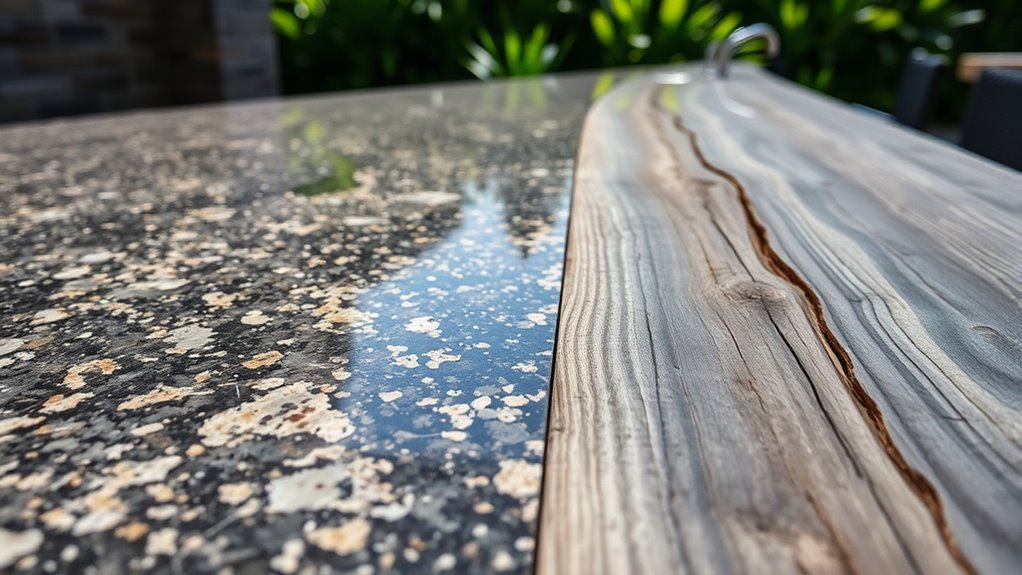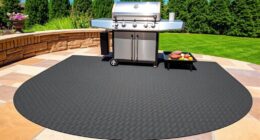When choosing outdoor countertops, opt for durable, weather-resistant options like concrete, natural stone (granite or slate), or engineered quartz. Avoid porous materials like marble that absorb water and are prone to cracking or staining. Prioritize low-maintenance surfaces that resist fading, cracking, and slipping. Be cautious about materials that aren’t slip-resistant, especially in moist conditions. To guarantee your outdoor space stays beautiful and safe, continue exploring expert tips to get the perfect fit for your climate and style.
Key Takeaways
- Do choose low-porosity, water-resistant materials like sealed granite or engineered quartz for outdoor durability.
- Not that natural stones like marble, which are porous and prone to water damage and staining outdoors.
- Do prioritize weather-resistant surfaces such as concrete or composite materials for harsh environments.
- Not that fragile or thin natural stones, which risk cracking, chipping, or fading under outdoor conditions.
- Do seal and maintain your outdoor countertops regularly to prolong lifespan and prevent damage.
Consider Your Climate and Environment

When choosing a countertop material for outdoor use, it’s essential to take into account your local climate and environment. Your climate influences how well certain materials withstand temperature fluctuations, moisture, and UV exposure. For example, if you live in a humid area, you’ll want a material resistant to mold and mildew, guaranteeing landscape integration remains seamless. Consider how your outdoor furniture influences the overall aesthetic; a material that complements your furniture style enhances the space’s harmony. If you experience harsh winters or intense sun, select materials that resist cracking, fading, or warping. Additionally, understanding the contrast ratio of materials can help you select surfaces that maintain their appearance under various lighting conditions. Matching your countertop to your environment ensures durability and keeps your outdoor space looking cohesive, functional, and inviting year-round. Proper consideration now saves you time and money later.
Prioritize Durable and Weather-Resistant Materials

Choosing the right countertop material means investing in durability that stands up to outdoor conditions. You want options that resist weather, UV rays, and temperature changes without deteriorating. Eco-friendly options like recycled composite or natural stone not only last longer but also reduce environmental impact. Look for materials with inherent weather resistance, such as concrete or quartz, which can handle rain, sun, and snow. Additionally, durability doesn’t mean sacrificing style—many materials offer color customization, so you can match your outdoor space’s aesthetic. Selecting weather-resistant, eco-friendly options ensures your countertops stay beautiful and functional for years. Water-resistant materials are especially beneficial in outdoor settings, as they provide added protection against the elements. Prioritizing these qualities helps you avoid frequent repairs or replacements, saving you time and money while maintaining an attractive outdoor area.
Avoid Porous Surfaces That Absorb Water
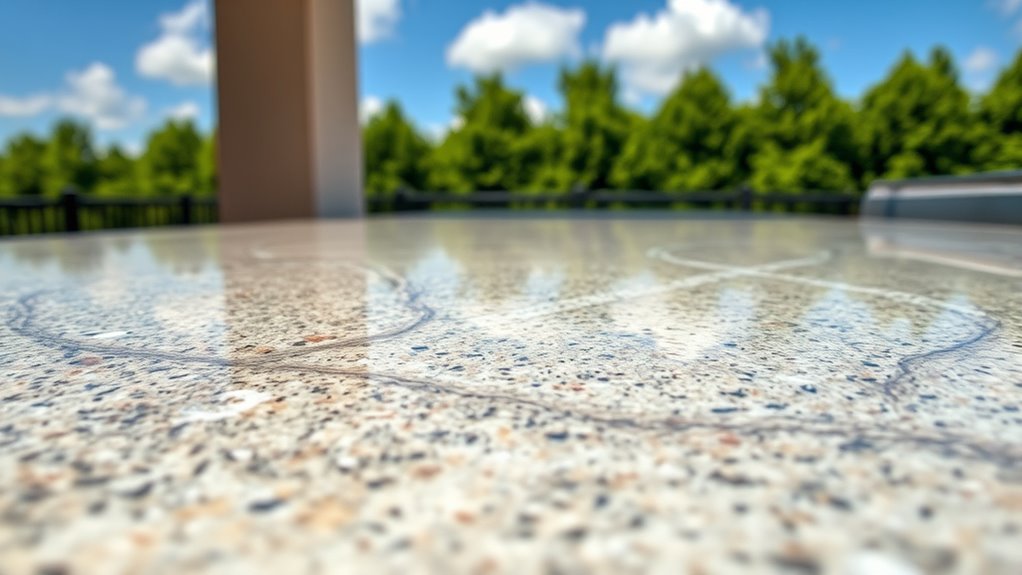
Porous surfaces can soak up water, leading to cracks or warping over time. This makes them less durable and harder to maintain outdoors. Choosing non-porous materials helps you avoid these water-related risks and keeps your countertop looking great longer. Incorporating keto-friendly ingredients into your outdoor cooking can also promote healthier meal options.
Water Absorption Risks
Porous countertop surfaces can pose significant risks outdoors because they absorb water easily, leading to damage over time. Water absorption worsens porosity issues, causing surfaces to crack, stain, or warp. When water seeps into the material, it can freeze and expand in colder months, worsening the damage. To avoid this, choose materials with low porosity and seal them properly. Here’s a quick comparison: Sealing is essential to prevent water infiltration and prolong the lifespan of your outdoor surfaces.
| Material | Water Absorption | Maintenance Needs |
|---|---|---|
| Natural Stone | High | Regular sealing |
| Quartz | Very Low | Minimal sealing |
| Concrete | Moderate | Sealant required |
Selecting non-porous options like quartz minimizes water absorption risks, ensuring durability and longevity for your outdoor countertop.
Material Durability Concerns
Since water can weaken and degrade materials over time, avoiding porous surfaces is essential for durability outdoors. Porous materials like marble elegance are more prone to water absorption, leading to cracking and staining. This compromises the countertop’s lifespan and appearance. Additionally, selecting surfaces with natural materials that have low porosity, such as a durable granite variety, which resists water infiltration and damage. Granite’s natural hardness and sealed surface make it ideal for outdoor use, ensuring it withstands weather changes without deterioration. Porous surfaces may initially look attractive, but their vulnerability to water damage makes them less practical long-term. Choosing materials that resist water absorption ensures your outdoor countertops remain intact, vibrant, and functional for years to come.
Maintenance Challenges
Moisture absorption not only weakens materials over time but also increases the effort needed to keep your outdoor countertops looking their best. Porous surfaces, like certain natural stones, can absorb water, leading to staining, cracking, and mold growth. This makes DIY installation more challenging, as sealing and maintenance become ongoing tasks. If you want your countertops to stay beautiful with minimal fuss, avoid porous materials that absorb water easily. Instead, opt for non-porous surfaces that resist moisture and are easier to clean. Additionally, consider using decorative accents that complement durable, low-maintenance materials. Proper sealing techniques can prevent water infiltration, further reducing water damage risks. This approach reduces long-term upkeep, prevents water damage, and keeps your outdoor space looking sharp without constant repairs or sealing.
Choose Low-Maintenance Options for Ease of Care
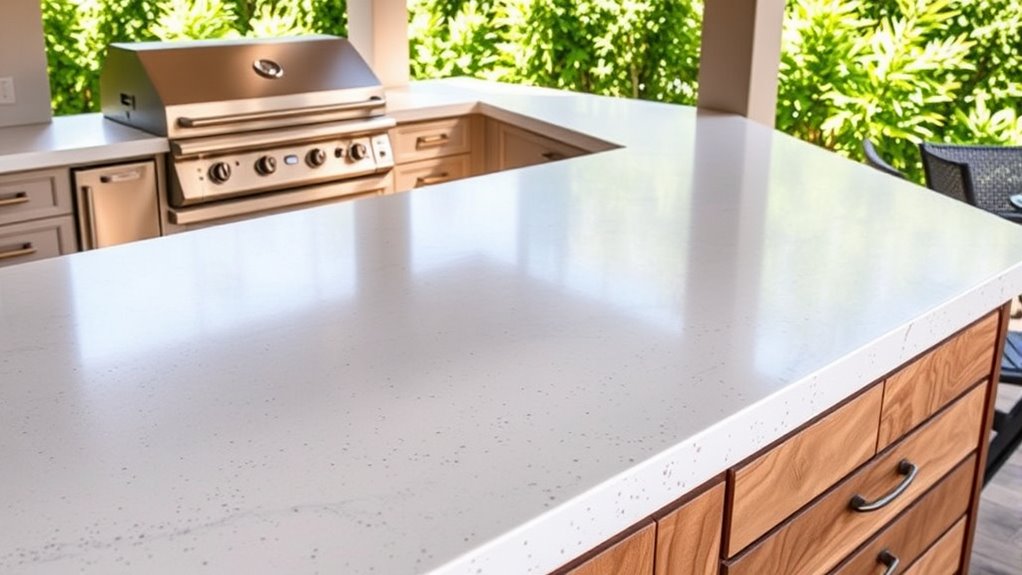
When selecting outdoor countertops, it’s important to think about materials that are durable and easy to maintain. Some options require minimal cleaning and sealing, saving you time and effort. By choosing low-maintenance materials, you’ll enjoy your outdoor space with less worry about ongoing upkeep. For example, selecting surfaces that resist weather damage can extend the lifespan of your countertops and reduce the need for frequent repairs.
Material Durability and Care
Choosing low-maintenance countertop materials can substantially reduce your outdoor care routine. Materials like quartz or engineered stone offer innovative design options that mimic natural elements while resisting stains, scratches, and weather damage. These options are highly durable, standing up to sun, rain, and temperature fluctuations without warping or fading. For easy care, they require minimal sealing or special treatments, saving you time and effort. Additionally, their consistent color and pattern make color coordination simple, allowing you to create a sleek, cohesive outdoor space. When selecting a material, consider its ability to withstand outdoor conditions while maintaining its appearance over time. Material durability is a key factor in ensuring your outdoor countertop remains beautiful and functional with little upkeep. Low-maintenance options not only enhance your outdoor aesthetic but also ensure your countertop stays beautiful with little upkeep.
Cleaning and Sealing Needs
Opting for low-maintenance countertop materials means you’ll spend less time cleaning and sealing, keeping your outdoor space looking its best with minimal effort. Materials like quartz or certain engineered stones require little to no sealing, so you can skip complex sealing techniques altogether. For surfaces that do need sealing, choose options with low absorption rates, reducing the frequency of cleanings and sealings. Typically, sealing techniques should be performed once a year or as recommended by the manufacturer. To keep your countertop pristine, clean it regularly using mild soap and water, avoiding harsh chemicals that can damage the surface. These low-maintenance options simplify upkeep, allowing you to enjoy your outdoor space without constant worry about cleaning frequency or sealing needs. Additionally, understanding the storage and expiration of items like juice or vape liquids can help you maintain a safe and clean environment.
Steer Clear of Materials Prone to Cracking or Chipping
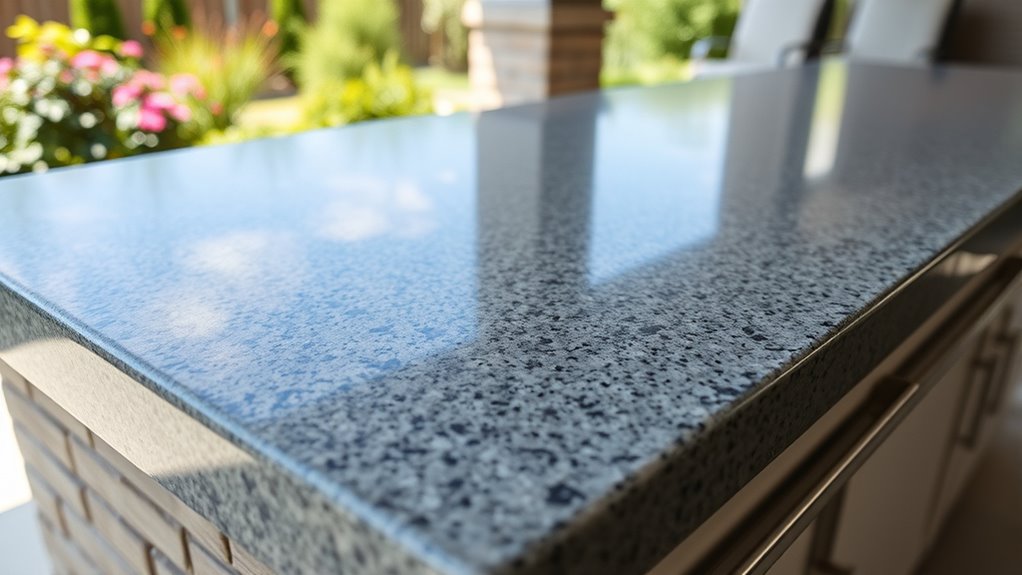
Materials that are prone to cracking or chipping can quickly turn into costly and frustrating choices for outdoor countertops. To avoid this, prioritize options with strong cracking prevention and high chipping resistance. Avoid fragile materials like certain natural stones or thin tiles that easily break under temperature fluctuations or impact. Instead, opt for durable surfaces like concrete or engineered quartz, which are designed to withstand outdoor conditions. Keep in mind that some materials, despite their appearance, may not handle the stress of outdoor use well. Choosing resilient options reduces maintenance costs and prolongs your countertop’s lifespan. Remember, investing in materials with proven cracking prevention and chipping resistance is key to maintaining a beautiful, functional outdoor space for years to come. Additionally, understanding the potential for wear and tear of different materials can help you select the most sustainable and long-lasting choice.
Match Your Material Choice to Your Aesthetic Preferences
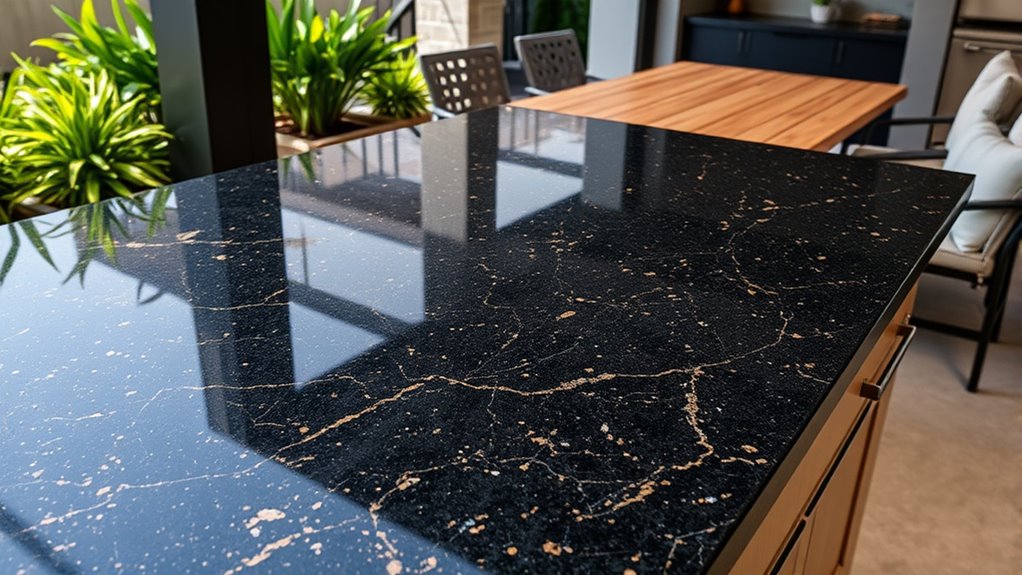
Your outdoor countertop should complement your overall aesthetic, so selecting a material that aligns with your design style is crucial. Consider color coordination to ensure the countertop blends seamlessly with your existing color palette, whether you prefer bold contrasts or subtle hues. Texture matching also plays a vital role; a sleek, polished surface suits modern designs, while a rough or natural finish complements rustic or Mediterranean styles. Think about how the material’s look and feel will integrate with your outdoor decor, furniture, and landscape. When your choice reflects your personal taste and enhances your space’s visual harmony, it creates a cohesive, inviting environment. Matching your material to your aesthetic preferences ensures your outdoor area feels intentional and stylish.
Check for Slip-Resistant and Safe Surfaces
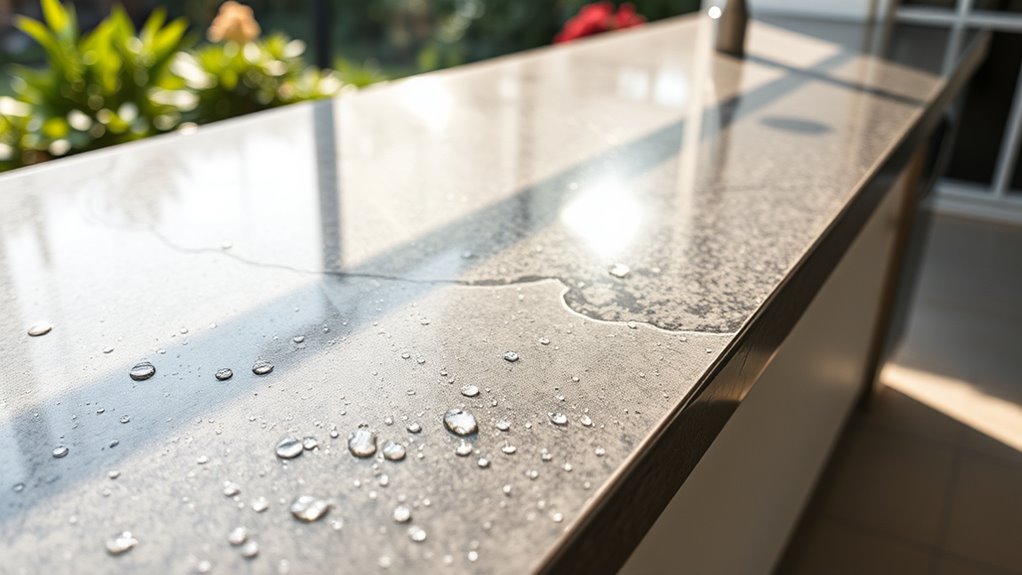
Since outdoor countertops are often exposed to moisture and varying weather conditions, ensuring the surface is slip-resistant is essential for safety. Look for materials that feature textured finishes, which can provide better grip and reduce slipping hazards. Additionally, consider applying non-slip coatings to your surface; these coatings enhance traction without compromising style. Some materials naturally have slip-resistant properties, but adding textured finishes or non-slip coatings offers extra safety, especially in wet conditions. Always test the surface for slipperiness after installation or treatment to ensure it meets safety standards. Prioritizing slip-resistant surfaces helps prevent accidents and makes your outdoor space safer for everyone, whether you’re cooking, entertaining, or relaxing outside.
Budget Wisely Without Compromising Quality
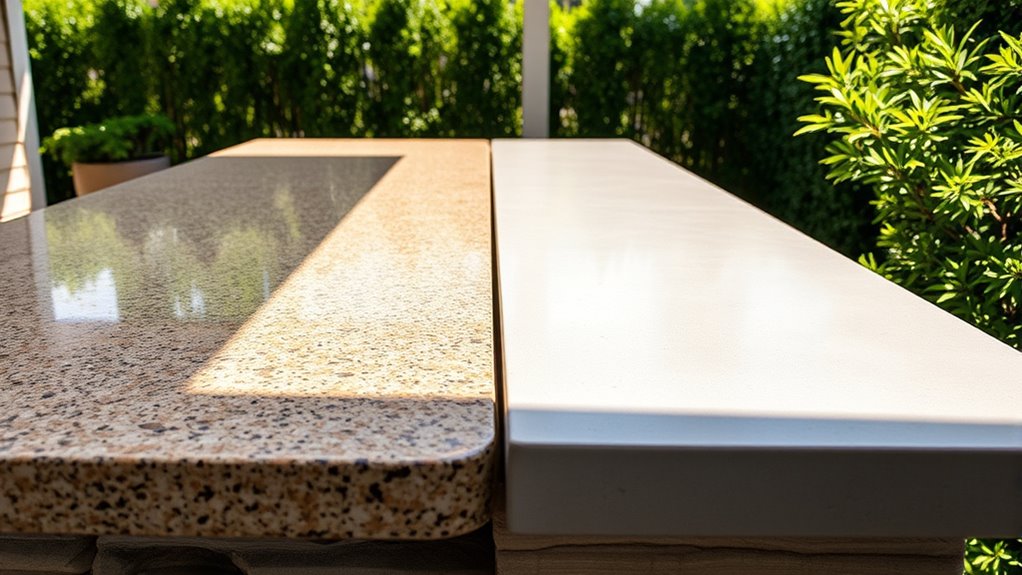
Balancing safety with budget considerations requires smart choices to guarantee you get quality outdoor countertops without overspending. To do this, explore cost-effective options that fit your financial plan while maintaining durability. Materials like concrete or laminate can be budget-friendly, yet they offer appealing aesthetics if chosen carefully. Consider aesthetic considerations, such as color, texture, and finish, to ensure your outdoor space looks inviting without breaking the bank. Look for options that combine affordability with longevity, so you won’t need frequent replacements. Comparing prices and benefits of different materials helps you make informed decisions. Remember, staying within budget doesn’t mean sacrificing style or safety—smart, well-researched choices will give you a beautiful, functional outdoor area that lasts.
Consult With Professionals Before Finalizing Your Selection
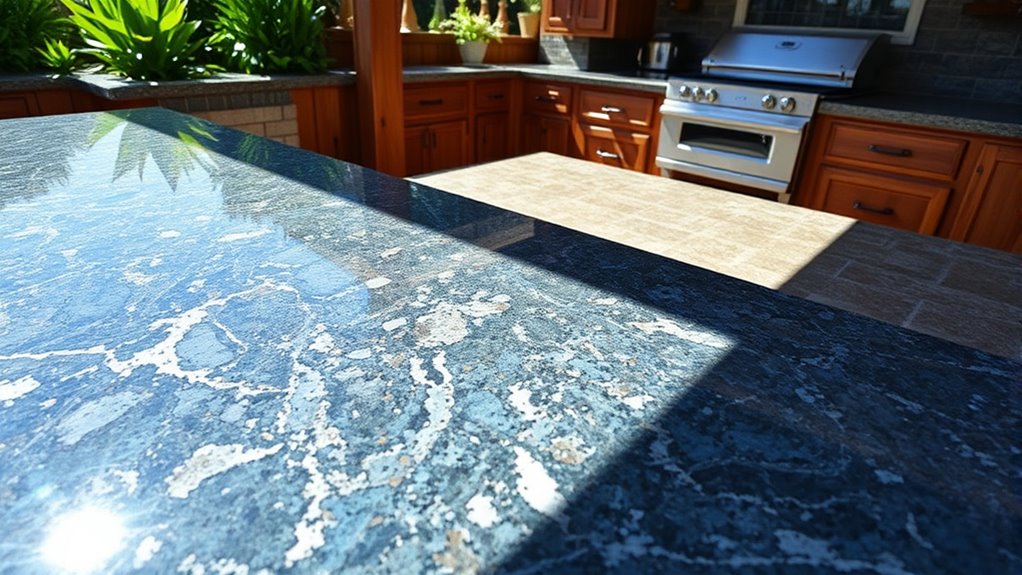
Before finalizing your outdoor countertop selection, consulting with professionals can save you time, money, and effort. They can help you evaluate how different materials fit into your landscape design and budget. Here are three reasons to seek expert advice:
- Optimize Material Cost: Professionals can recommend cost-effective options that match your landscape’s aesthetic without overspending.
- Align with Landscape Design: They ensure your countertop complements existing elements, creating a cohesive outdoor space.
- Assess Durability and Maintenance: Experts can advise on materials that withstand your climate and are easy to maintain long-term.
Frequently Asked Questions
Which Outdoor Countertop Materials Are Environmentally Friendly?
You should choose sustainable options like recycled glass, bamboo, or concrete with eco-friendly production methods for outdoor countertops. These materials are environmentally friendly because they use recycled or renewable resources, reducing waste and minimizing impact. By opting for these sustainable choices, you help protect the environment while enjoying durable, stylish surfaces. Always look for products that emphasize eco-friendly production practices to guarantee you’re making responsible, green decisions for your outdoor space.
How Do I Prevent Outdoor Countertops From Staining?
To prevent outdoor countertops from staining, you should apply sealing techniques regularly, as they create a barrier against liquids and spills. Additionally, consider using stain-resistant coatings that repel stains before they set in. Clean spills promptly with mild soap and water, and avoid harsh chemicals. These steps help maintain your countertops’ appearance and longevity, keeping them looking fresh and protected from common outdoor stains.
Are There Heated Outdoor Countertop Options for Winter?
Heated surfaces help you handle harsh winter weather. You can opt for electric or hydronic heated outdoor countertops, providing warmth and working with winter insulation. These systems heat the surface evenly, preventing ice and frost buildup. By choosing heated outdoor countertops, you enjoy outdoor cooking without worry, even in winter’s chill. Just guarantee proper installation and insulation, and you’ll have a cozy, comfortable outdoor space all season long.
Can I Install Outdoor Countertops Myself or Hire a Professional?
You can definitely attempt DIY installation if you have experience, but for a seamless, durable finish, hiring a professional is wise. Professional guidance guarantees proper measurements, material handling, and secure installation, especially with outdoor countertops exposed to weather. If you’re confident in your skills, follow detailed instructions carefully. Otherwise, investing in expert help guarantees safety, longevity, and an attractive result that withstands outdoor conditions.
What Is the Lifespan of Different Outdoor Countertop Materials?
Imagine your outdoor space, weathering seasons like a seasoned traveler. The durability comparison of materials varies; natural stone like granite can last 20+ years with minimal maintenance, while concrete might need sealing every few years to prevent cracks. Quartz offers a sleek look but is less heat-resistant, lasting around 10-15 years. Choose wisely based on your maintenance willingness and how long you want your beautiful outdoor haven to endure.
Conclusion
Choosing the right outdoor countertop isn’t just about looks; it’s about anticipating what nature throws your way. Will your choice withstand storms, sun, or heavy use? The perfect material balances durability, style, and safety—yet one essential factor could change everything. Are you prepared to uncover the key detail that makes or breaks your outdoor space? Stay tuned, because your ideal countertop might be closer than you think—if you know what to look for.
